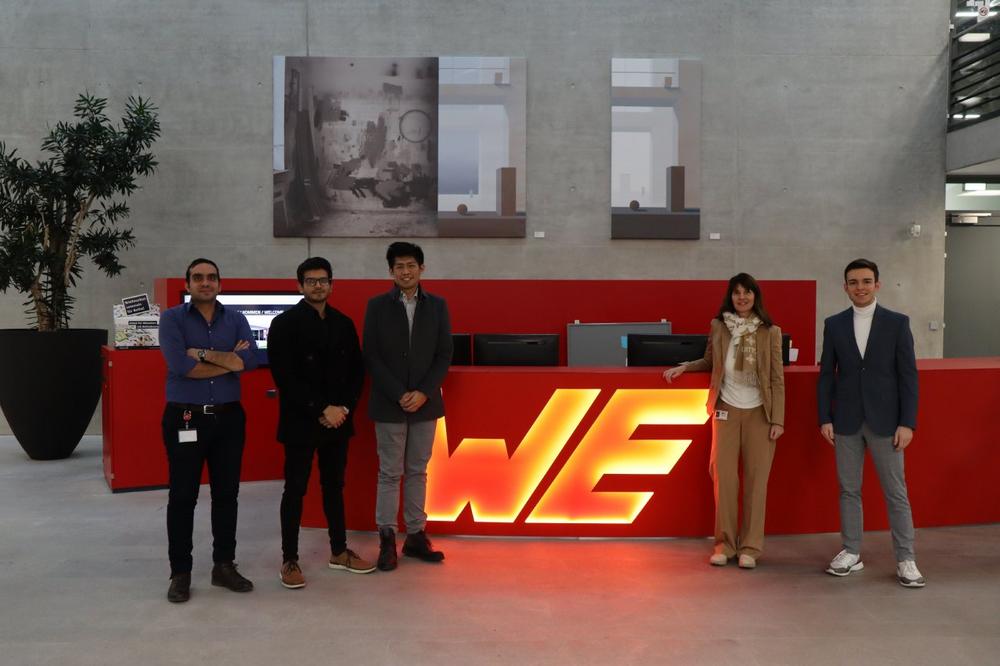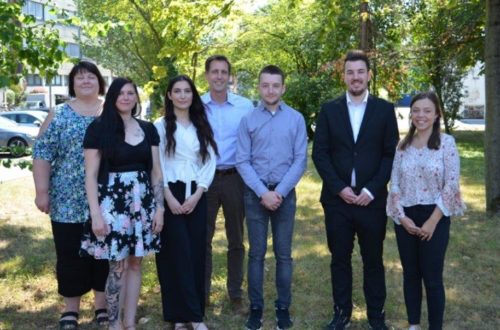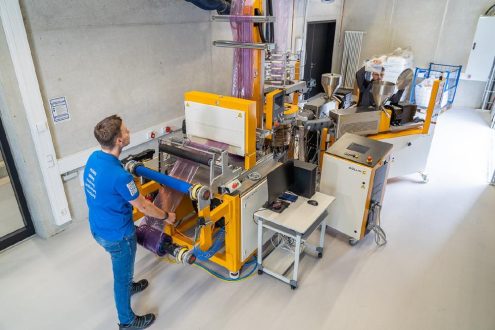
Successfully bridging the gap between theory and practice
What happens when three students from Taiwan, Pakistan and Iran, who hardly knew each other beforehand, are asked to complete a challenging project in just five days? When have to travel 40 kilometers from their home in Heilbronn to their temporary workplace at Würth Elektronik ICS GmbH & Co. KG in Niedernhall every day they – despite farmers‘ protests and rail strike? Enthusiasm is the result. "We are thrilled with what we received," says Karmela Bürkert, Head of HR at Würth Elektronik ICS, euphorically. "They provided us with a solution in a very short space of time that fits our requirements perfectly and that we can implement in practice with just a few small additions. That exceeded our expectations."
The reason for Bürkert’s enthusiasm: a tool that Chun-Te Lee, Babak Hasanidarabadi and Raza-Ur-Rehman, all students on the Master’s degree course in Management at the TUM Campus Heilbronn, developed during the "1000+" project week organized by TUM. The three students present their digital HR tool, which serves as the basis for recruitment and annual interviews, on the final day of the project week. The special thing about the tool: It can be tailored to the individual employee. And it takes into account not only purely monetary aspects, but also topics such as career prospects, personal development and work-life balance.
Digitalization is the key
Leon Zurbel, who is responsible for HR marketing and the "1000+" project week at Würth Elektronik ICS, describes how focused the three students were on their project: "Whenever I stopped by, everyone was highly concentrated. This shows that the students are really interested in helping to shape, collaborate and realize their ideas." The trio performed with corresponding confidence at the final presentation in front of Bürkert and Zurbel. And finally, the three give a recommendation: "Digitalization is the key to a continued successful future."
The three students have noticed some differences to their home countries: "There is a really high level of loyalty to the company here," says Taiwanese Chun-Te Lee. "I’m a bit surprised that someone works for the same company for 40 years. This is almost never the case in other international firms or large global enterprises."
Backbone of the German economy
Medium-sized family businesses are something special for them: "They are the backbone of the German economy," says the second member of the group, Raza-Ur-Rehman from Pakistan. "It’s exciting to see how dynamic they are and how many customers they have. The high quality they offer and their customer focus give them a competitive advantage over rivals who have outsourced their production." The Iranian Babak Hasanidarabadi was particularly impressed by the long history of many companies: "Here in Germany, companies often have decades of history. That is really extraordinary." Insights into the culture of the Würth Group were provided at the end of the project week during a visit to the Würth Museum in Künzelsau.
What is the most important thing they take away from "1000+"? Raza believes that the project week has done a very good job of bridging the gap between management, technology and digitalization at TUM. Babak is particularly pleased with the productive teamwork during the week. And Chun-Te learned how much you can achieve in a limited amount of time and with few resources if you really want to: "We had to use the short time to find out what we needed to do and how we needed to do it. To do this, we had to step out of our comfort zone and come to terms with the other team members, the new project and the new company. And that’s exactly why we enjoyed it so much."
The day of truth
"Talents speak the same language," says Aritra Ghosh, a former student at the Technical University of Munich (TUM), after five days as a participant in the "1000+ Project Week". Together with four current TUM students from Heilbronn and Munich, he developed a solution for business development in the Heilbronn area. The aim was to develop a training module for employees of small and medium-sized companies.
On this day, the presentation is due. Four team members show the results of the project week. The fifth team member unfortunately had to leave early due to the rail strike, but keeps his fingers crossed from Munich for a successful presentation of the results. The managers of tomorrow have dressed up and are leading the presentation with confidence. From the size of the training groups to possible financing options and the use of modern technology such as VR glasses, the students have thought of everything. Two short videos about the organization of productions were also created.
The result of hard work: "We got up very early, had breakfast, then went to the business development office and worked until dark," reports Autri Mandal from Bangladesh, who is currently doing his Master’s in Civil Engineering at TUM in Munich. The team also includes Chutikran Srisuwan from Thailand, Qianyun Li from China, Aritra Ghosh from India and Alireza Sayazadeh from Iran. An internationally diverse group that has a lot in common despite their different backgrounds: On the one hand, studying at TUM and on the other, the motivation to achieve something big. "We quickly learned to organize ourselves optimally and quickly, to perfect communication and to work hand in hand," reports "local heroine" Srisuwan. The Management student adds: "Unfortunately, I haven’t had time to show our fellow Munich students the campus in Heilbronn because of all the work, but luckily we do now."
New perspectives and inspiration
The project sponsor, Wirtschaftsförderung für den Raum Heilbronn (WFG), is also very enthusiastic: "The students are technically adept and highly motivated," says Felix Sossalla, project manager for hydrogen, and continues: "In just a few days, they have learned to change their perspective and look at the big picture." The next few days will show to what extent the results can be put into practice. The project manager is confident: "In any case, completely new ideas and a new concept have emerged."
Patrick Dufour, Managing Director of WFG, emphasizes the importance of the newly created ecosystem in Heilbronn: "It is a strength of the business location to have these strong universities on site. With TUM, we are operating on an equal footing with many other locations." The trending topic of artificial intelligence has been the driving force in the region for several years. "The community of companies and educational institutions will also find incredibly interesting solutions for the challenges ahead," says Dufour confidently. He considers the project week as a win-win situation and is therefore looking forward to a continuation in the near future: "We will apply for a student group again next year if we get the chance."
Die TUM Campus Heilbronn gGmbH
Bildungscampus 2
74076 Heilbronn
Telefon: +49 (0) 7131 264180
Telefax: +49 (7131) 645636-27
https://www.chn.tum.de/de
Telefon: +49 (7131) 26418-501
E-Mail: Kerstin.Besemer@tumheilbronn-ggmbh.de
![]()




